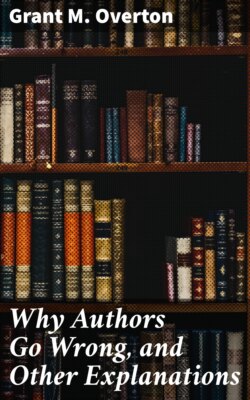Читать книгу Why Authors Go Wrong, and Other Explanations - Grant M. Overton - Страница 18
На сайте Литреса книга снята с продажи.
4
ОглавлениеTable of Contents
Now for the cases.
It is the duty, the opportunity and the privilege of America now, in the present hour, to make it impossible hereafter for any one to raise such a question as Bliss Perry brings up in his book The American Spirit in Literature, namely, whether there is an independent American literature. Not only does Mr. Perry raise the question, but, stated as baldly as we have stated it, the query was thereupon discussed, with great seriousness, by a well-known American book review! We are happy to say that both Mr. Perry and the book review decided that there is such a thing as an American literature, and that American writing is not a mere adjunct (perhaps a caudal appendage) of English literature. All Americans will feel deeply gratified that they could honorably come to such a conclusion. But not all Americans will feel gratified that the conclusion was reached on the strength of Emerson, Lowell, Longfellow, Whittier, Holmes, Whitman, Poe and others of the immortal dead. Some Americans will wish with a faint and timid longing that the conclusion might have been reached, or at least sustained, on the strength of Tarkington, Robert Herrick, Edith Wharton, Mary Johnston, Gertrude Atherton, Mary S. Watts, William Allen White, Edgar Lee Masters, Amy Lowell, Edna Ferber, Joseph Hergesheimer, Owen Wister and a dozen or so other living writers over whose relative importance as witnesses for the affirmative we have no desire to quarrel. Mr. Howells, we believe, was called to the stand.
If we had not seen it we should refuse to credit our senses. The idea of any one holding court to-day to decide the question as to the existence of an independent American literature is incredibly funny. It is the peculiarity of criticism that any one can set up a court anywhere at any time for any purpose and with unlimited jurisdiction. There are no rules of procedure. There are no rules of evidence. There is no jury; the people who read books may sit packed in the court room, but there must be no interruptions. Order in the court! Usually the critic-judge sits alone, but sometimes there are special sessions with a full bench. Writs are issued, subpœnas served, witnesses are called and testimony is taken. An injunction may be applied for, either temporary or permanent. Nothing is easier than to be held in contempt.
